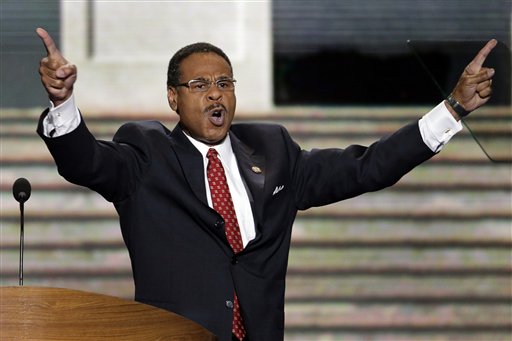Rep. Emanuel Cleaver (D-Mo.) — an ordained Methodist minister — opened the first session of the 117th U.S. Congress on Sunday by praying to numerous gods and redefining the religious word “amen” into some sort of commentary on sex and gender.
The progressive lawmaker began his prayer using explicitly Christian language, acknowledging God’s “sacred supremacy,” noting that, without His “favor and forbearance, we enter this new year relying dangerously on our own fallible nature.”
Cleaver went on to reference the Old Testament passage of Numbers 6:24-26, praying, “May the God who created the world and everything in it bless us and keep us. May the Lord make His face to shine upon us and be gracious unto us. May the Lord lift up the light of His countenance on us and give us peace: peace in our families, peace across this land, and — dare I ask, O Lord — peace even in this chamber, now and evermore.”
It was at that point that the Democrat’s prayer took a very odd turn.
First, Cleaver gave credit not only to the Christian God, but to countless other deities to whom people of other faiths pray. He credited “Brahma,” a four-faced Hindu deity, as well as “‘god’ known by many names by many different faiths.”
“Amen and awoman,” he closed, bizarrely.
Of course, the word has absolutely no meaning as it relates to one’s sex or gender identity. The word “amen,” historically invoked at the end of a prayer, has its roots in a Hebrew word that means “certainty” or “truth.”
The ancient religious declaration is invoked by those of Christian, Muslim, and Jewish faiths.
In the Greek Old Testament, the word “amen” is usually translated to mean “so be it,” according to Britannica. In English translations of Scripture, it is typically understood to mean “truly” or “verily”:
In its earliest use in the Bible, the “amen” occurred initially and referred back to the words of another speaker with whom there was agreement. It usually introduced an affirmative statement. For emphasis, as in solemn oaths, the “amen” was sometimes repeated. The use of the initial “amen,” single or double in form, to introduce solemn statements of Jesus in the Gospels (52 times in the Synoptic Gospels — Matthew, Mark, and Luke — and 25 times in the Gospel According to John) had no parallel in Jewish practice. Such “amens” expressed the certainty and truthfulness of the statement that followed.
It’s noteworthy that someone like Cleaver, who spent dozens of years serving as a pastor at St. James United Methodist Church in Kansas City, Missouri, would either not understand the origin of the word “amen” or simply totally redefine it to fit a narrative regarding sexual orientation and gender identity.
Cleaver gained notoriety in July 2019, when he, serving as the presiding officer in the U.S. House of Representatives, abandoned the chair, declaring both sides — Democrats and Republicans — “just want to fight.” He made the comment after lawmakers erupted into shouting matches over a floor resolution to condemn tweets from President Donald Trump.
He later told Fox News that he and House Chaplain Patrick Conroy spoke earlier that day about “all of the chaos and confusion” consuming lawmakers. At the time, Cleaver said Conroy told him: “You know, I feel a presence in here, an evil presence.”
“He said it’s not a Democrat or a Republican,” Cleaver recalled. “He said there’s something else going on here. He said, ‘I’m going to have to pray tomorrow to ask God to cleanse this place.’”



